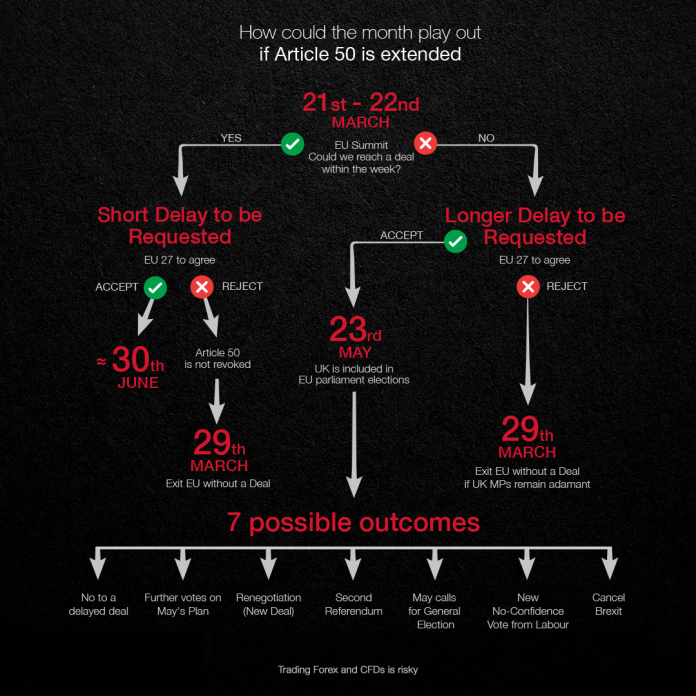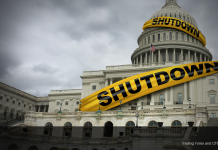Last week, lawmakers in London ruled out a no-deal scenario under any circumstance and voted for an extension in the Brexit process while rejecting a number of amendments. Another motion, which aimed at taking parliamentary time away from the government, and which would have marked a significant parliamentary power move on Prime Minister May’s government, failed narrowly, by just 2 votes.
Lawmakers in the end backed the government motion that the UK should ask for a short term technical extension until the end of June if parliament has backed May’s deal by March 20, which is the day before the next EU summit.
That is a big if and the motion also acknowledged, or rather threatened, that if the deal is not backed, a long delay will be inevitable.
The June 20th is a timeframe that is partly dictated by the timing of the European Parliament elections, which are due to be held May 23-26 across all EU countries, which would include the UK, if it is still part of the EU at that point.
Parliament is not actually set to convene until early July, so PM May has been arguing that as long as the UK has exited the EU by the end of June, it would remove the obligation for elections. Indeed, there were reports that German Chancellor Merkel suggested behind the scenes that an extension until May 23 would be «very easy», one until the end of June just «easy». At the moment the thinking among the hard core Brexiteers still seems to be that the EU will change its stance if under sufficient pressure.
PM May meanwhile clearly still hopes that she will have a third chance to try and get her deal through and that now. Indeed, there seems to be some movement among the DUP members at least and given that it looks as though parliament is about to take control of the process, more Brexiteers may be willing to back the deal given that the alternative is a lengthy delay or the risk that Brexit will be cancelled altogether. In that case and with the deal on the finishing line a short term extension to allow London to get the necessarily legislation underway would likely be a technicality.
If parliament hasn’t agreed to the deal on the table by March 20, the EU council will want a clear reasoning for a delay and an alternative plan before accepting a longer delay. A delay could allow, the talks about the future trading relationship between the EU-UK to be finalised, which would make the Irish backstop obsolete.
At EU leader level, the backing of all other 27 member states. It would only take one veto from the EU27 against agreeing to a delay to deny the UK an extension, though the UK would still have the unilateral right to revoke Article 50 and terminate Brexit. This would be a deeply divisive course of action in the UK, but such a move, which seems highly unlikely at this juncture, would almost certainly be accompanied by a legally-binding referendum on EU membership.
So the question is whether MPs in London, finally manage to also agree on what they actually do want going forward.
One of the amendments rejected last week, included the proposal that parliament schedules some time this week to let MPs explore a series of motions on alternative forms of Brexit. This could feasibly include a permanent customs union, continued membership of the single market or another referendum, possibly one that doesn’t put no-deal up for the vote, but instead only offers a choice between May’s deal, or revoking Article 50 and staying in the EU.
No Confidence Vote / General Elections: As for UK Prime Minister, she will have been strengthened somewhat by the rejection of the motion that would have given more control to parliament and indeed, her position seems relatively secure as a confidence vote in her leadership can’t be tabled for another year (having recently survived one) while Labour’s machinations for a general election via a confidence vote on the government won’t likely fly as the Tory-DUP governing alliance has the votes to prevent it.
Meanwhile, a long delay would give time to actually work out the final trade deal and thus avoid the need for a backstop on the Irish border issue. That had only become necessary once it was clear that the 2 years between the Article 50 notification and the actual Brexit date would not be sufficient to agree on withdrawal terms as well as a detailed agreement on the future trading relationship between the EU and the U.K. The big question though is whether the 2-year transition period currently envisaged would be sufficient even if May gets her deal through and that will depend on whether there is a rethink in London about the red lines that guide the negotiations. If her deal doesn’t get through and there is a lengthy extension and London starts a rethink without having agreed on alternative options beforehand, this could in fact become a very long delay, which is something EU leaders as well as Brexiteers in London will also have in mind.
At the moment then, everything remains fluid, quickly changing and everything is still possible, which does not make it any easier for companies on both sides of the channel.
Click here to access the Economic Calendar
Andria Pichidi
Market Analyst
Disclaimer: This material is provided as a general marketing communication for information purposes only and does not constitute an independent investment research. Nothing in this communication contains, or should be considered as containing, an investment advice or an investment recommendation or a solicitation for the purpose of buying or selling of any financial instrument. All information provided is gathered from reputable sources and any information containing an indication of past performance is not a guarantee or reliable indicator of future performance. Users acknowledge that any investment in FX and CFDs products is characterized by a certain degree of uncertainty and that any investment of this nature involves a high level of risk for which the users are solely responsible and liable. We assume no liability for any loss arising from any investment made based on the information provided in this communication. This communication must not be reproduced or further distributed without our prior written permission.



















